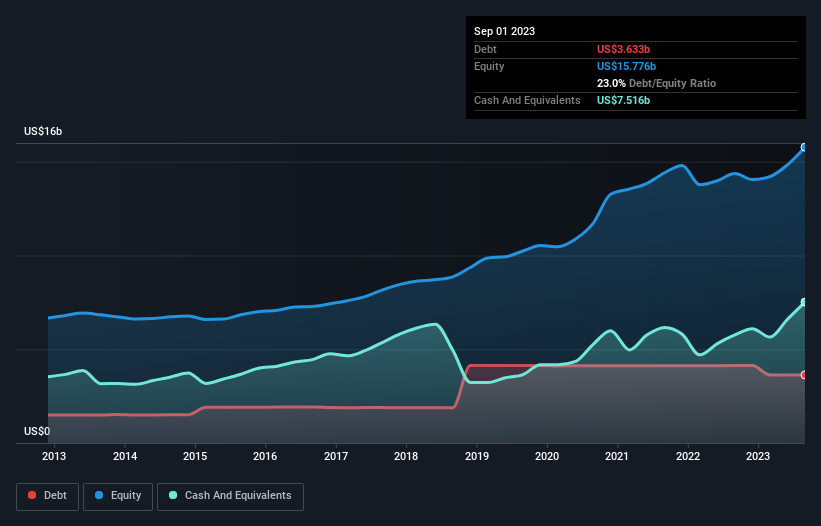
Legendary fund manager Li Lu (who Charlie Munger backed) once said, 'The biggest investment risk is not the volatility of prices, but whether you will suffer a permanent loss of capital.' So it might be obvious that you need to consider debt, when you think about how risky any given stock is, because too much debt can sink a company. We note that Adobe Inc. (NASDAQ:ADBE) does have debt on its balance sheet. But should shareholders be worried about its use of debt?
What Risk Does Debt Bring?
Debt is a tool to help businesses grow, but if a business is incapable of paying off its lenders, then it exists at their mercy. Part and parcel of capitalism is the process of 'creative destruction' where failed businesses are mercilessly liquidated by their bankers. However, a more usual (but still expensive) situation is where a company must dilute shareholders at a cheap share price simply to get debt under control. Of course, debt can be an important tool in businesses, particularly capital heavy businesses. The first thing to do when considering how much debt a business uses is to look at its cash and debt together.
View our latest analysis for Adobe
What Is Adobe's Net Debt?
You can click the graphic below for the historical numbers, but it shows that Adobe had US$3.63b of debt in September 2023, down from US$4.13b, one year before. However, its balance sheet shows it holds US$7.52b in cash, so it actually has US$3.88b net cash.

How Healthy Is Adobe's Balance Sheet?
The latest balance sheet data shows that Adobe had liabilities of US$8.33b due within a year, and liabilities of US$4.98b falling due after that. On the other hand, it had cash of US$7.52b and US$1.85b worth of receivables due within a year. So it has liabilities totalling US$3.95b more than its cash and near-term receivables, combined.
Having regard to Adobe's size, it seems that its liquid assets are well balanced with its total liabilities. So while it's hard to imagine that the US$230.8b company is struggling for cash, we still think it's worth monitoring its balance sheet. Despite its noteworthy liabilities, Adobe boasts net cash, so it's fair to say it does not have a heavy debt load!
The good news is that Adobe has increased its EBIT by 5.2% over twelve months, which should ease any concerns about debt repayment. There's no doubt that we learn most about debt from the balance sheet. But ultimately the future profitability of the business will decide if Adobe can strengthen its balance sheet over time. So if you're focused on the future you can check out this free report showing analyst profit forecasts.
Finally, a company can only pay off debt with cold hard cash, not accounting profits. Adobe may have net cash on the balance sheet, but it is still interesting to look at how well the business converts its earnings before interest and tax (EBIT) to free cash flow, because that will influence both its need for, and its capacity to manage debt. Over the last three years, Adobe actually produced more free cash flow than EBIT. There's nothing better than incoming cash when it comes to staying in your lenders' good graces.
Summing Up
We could understand if investors are concerned about Adobe's liabilities, but we can be reassured by the fact it has has net cash of US$3.88b. The cherry on top was that in converted 119% of that EBIT to free cash flow, bringing in US$7.6b. So is Adobe's debt a risk? It doesn't seem so to us. We'd be very excited to see if Adobe insiders have been snapping up shares. If you are too, then click on this link right now to take a (free) peek at our list of reported insider transactions.
If you're interested in investing in businesses that can grow profits without the burden of debt, then check out this free list of growing businesses that have net cash on the balance sheet.
New: Manage All Your Stock Portfolios in One Place
We've created the ultimate portfolio companion for stock investors, and it's free.
• Connect an unlimited number of Portfolios and see your total in one currency
• Be alerted to new Warning Signs or Risks via email or mobile
• Track the Fair Value of your stocks
Have feedback on this article? Concerned about the content? Get in touch with us directly. Alternatively, email editorial-team (at) simplywallst.com.
This article by Simply Wall St is general in nature. We provide commentary based on historical data and analyst forecasts only using an unbiased methodology and our articles are not intended to be financial advice. It does not constitute a recommendation to buy or sell any stock, and does not take account of your objectives, or your financial situation. We aim to bring you long-term focused analysis driven by fundamental data. Note that our analysis may not factor in the latest price-sensitive company announcements or qualitative material. Simply Wall St has no position in any stocks mentioned.
About NasdaqGS:ADBE
Very undervalued with outstanding track record.
Similar Companies
Market Insights
Community Narratives



